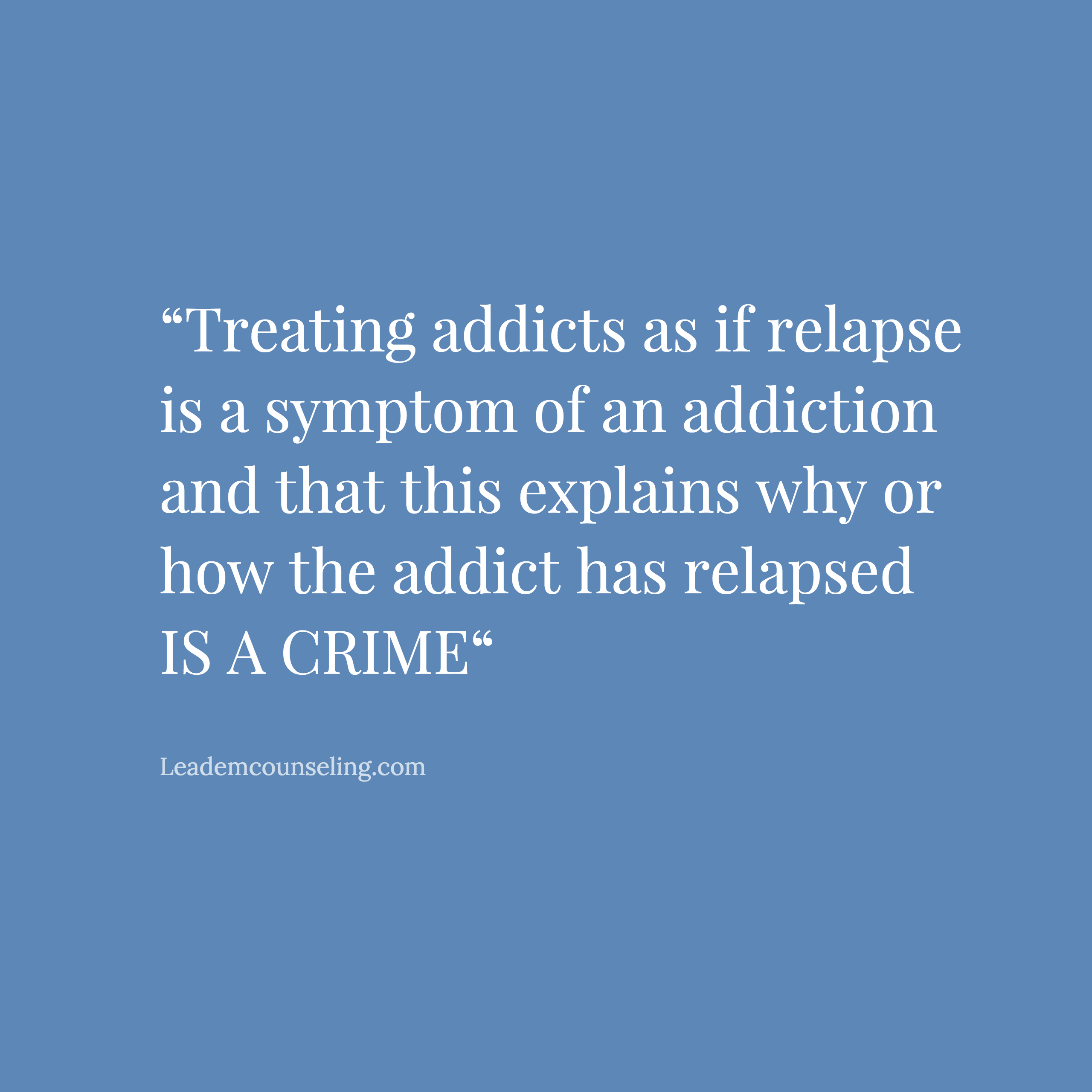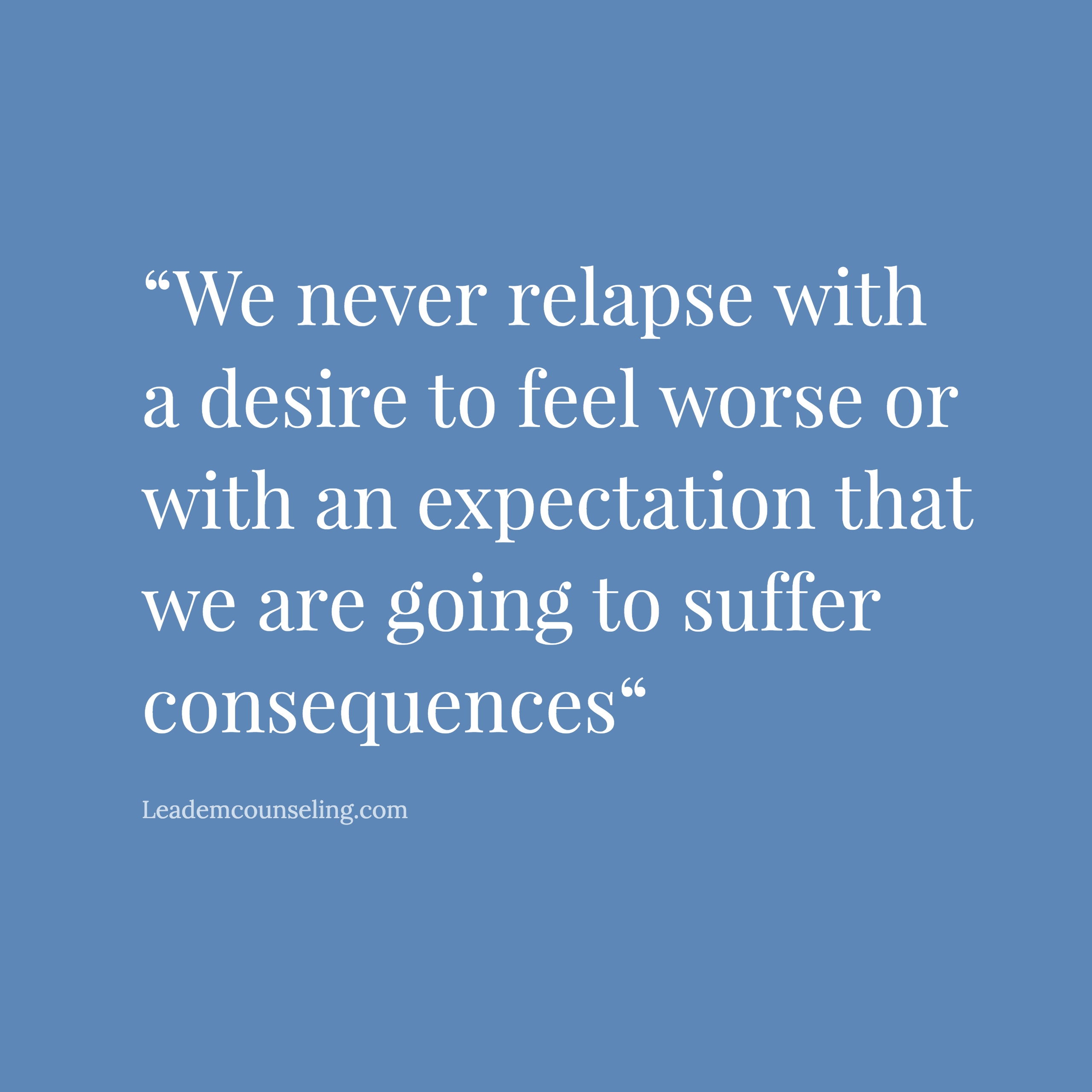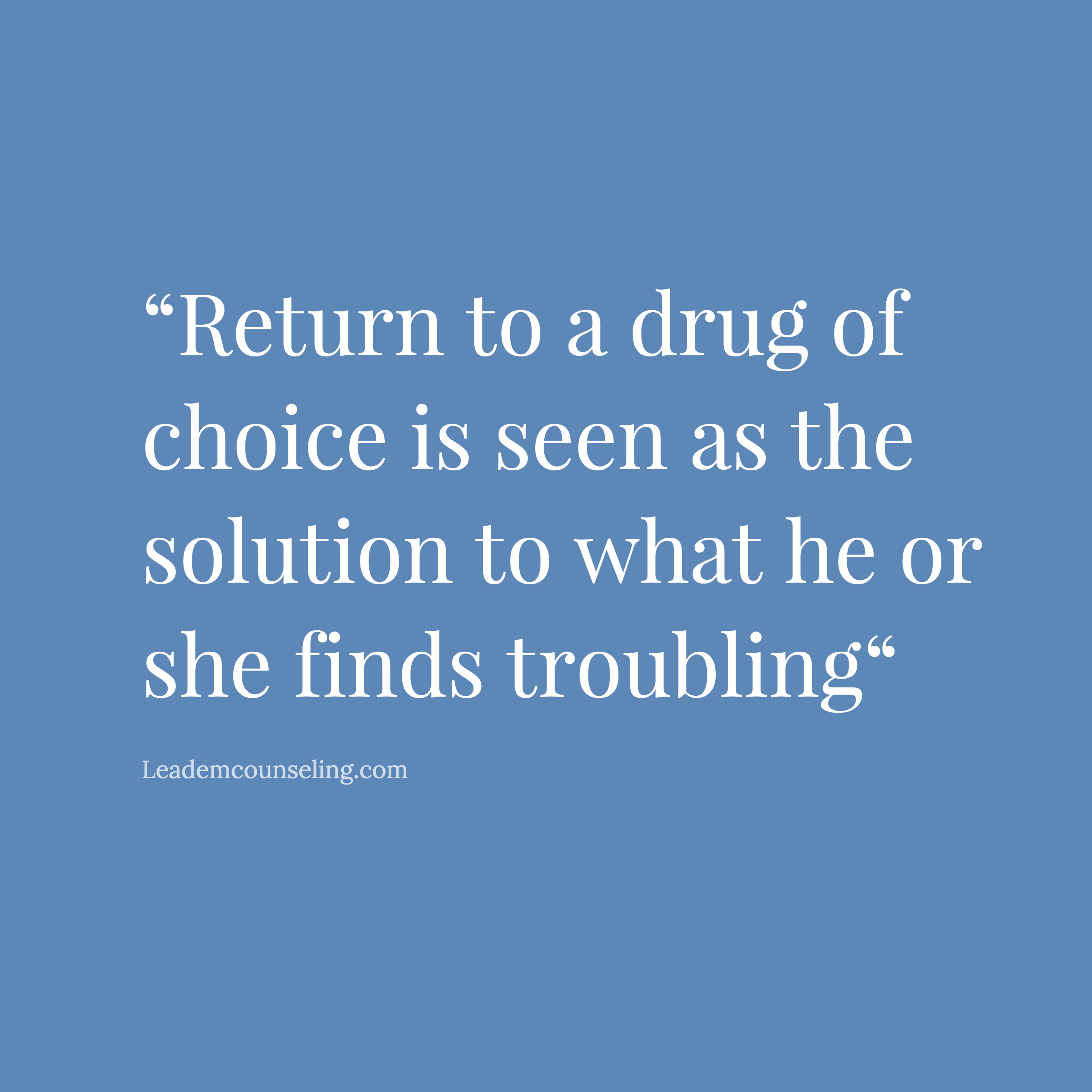The Process of Relapse Recovery
Relapse is a process, not an event, and NOT a crime
 The Boston Globe ran a story in September[1] of last year which reported on a case involving a woman who violated her probation by using drugs citing that leniency was shown when the judge sent the woman to a treatment program rather than a woman’s prison. When she was presented for violation of her probation again for another dirty urine screen, the paper reports that the judge crumpled the letter she had written him in which she apologized and thanked him for the compassion he had shown her in the past decision. The case has been argued in Massachusetts Supreme Court and a decision is expected in the Spring of 2018. According to National Public Radio the case is about whether or not relapse by an opioid addict should be treated as a crime[2].
The Boston Globe ran a story in September[1] of last year which reported on a case involving a woman who violated her probation by using drugs citing that leniency was shown when the judge sent the woman to a treatment program rather than a woman’s prison. When she was presented for violation of her probation again for another dirty urine screen, the paper reports that the judge crumpled the letter she had written him in which she apologized and thanked him for the compassion he had shown her in the past decision. The case has been argued in Massachusetts Supreme Court and a decision is expected in the Spring of 2018. According to National Public Radio the case is about whether or not relapse by an opioid addict should be treated as a crime[2].
The court of public opinion continues to try the case in the social media. Some would hold that the judge’s behavior in the courtroom was an effort to shame the victim for relapsing and his disregard for her apology letter was as shameful as the addict’s relapse. Others would have you believe that an addict has no control over whether or not to use drugs again and should never be held accountable since they have a disease. The proponents of his argument cite the brief submitted to the court by the Massachusetts Medical Society which maintains that relapse is a symptom of addiction and should be treated and not punished.
Having an Addiction Should Not be a Crime
 We are not going to join in the fight except to say that having an addiction should not be a crime and relapse should not be treated as a crime; however, treating addicts as if relapse is a symptom of an addiction and that this explains why or how the addict has relapsed IS A CRIME. Every addict can relapse — that is true. But it is equally true that every addict can get and stay sober. Addicts who are led to believe that relapses are natural features of the disease of addiction and it is likely for them to relapse again and again regardless of the legal or emotional consequences are further victimized by this ignorance.
We are not going to join in the fight except to say that having an addiction should not be a crime and relapse should not be treated as a crime; however, treating addicts as if relapse is a symptom of an addiction and that this explains why or how the addict has relapsed IS A CRIME. Every addict can relapse — that is true. But it is equally true that every addict can get and stay sober. Addicts who are led to believe that relapses are natural features of the disease of addiction and it is likely for them to relapse again and again regardless of the legal or emotional consequences are further victimized by this ignorance.
This addict’s relapse has made it to a state supreme court and unfortunately there will be a winner and a loser but we see it differently. We fear that there will be great loses on each side of the high court’s decision. If the defendant is sent to jail rather than having the benefit of a higher level of treatment alternative that helps her get to the bottom of her relapse process, a gross injustice will have been permitted. Regretfully, it will be equally tragic if she wins her case and left to believe that she had no choice over the imperious urge to use drugs again because the high court has ruled that she is a victim of a disease whose recovery includes relapse.
She had a choice but it is unclear if the choice was well-informed. For example, one NPR account reports her as saying that her probation office “didn’t look [to see] that I had just gotten started getting everything in order. She just saw that I had a ‘dirty urine,’ and she just sent me in front of the judge to go to jail.” The disclaimer would appear to have come from an addict who was led to believe in a harm reduction model for recovery or was deeply engrossed in denial which is a hallmark feature of the disease. Regardless of what motivated her disclaimer, we do not believe progress in recovery is being made or that an addict can “start getting things in order” if he or she is continuing to relapse. We think that there is something missing in the recovery process or treatment program for the person who continues to relapse in spite of the devastating odds of getting caught.
We believe that relapse is a process and not an event and as such can be identified, intervened on, and prevented.
How to Commit Yourself to Sober Living
 A commitment to sober living begins with a decision to be abstinent from the object of your addictive compulsion, but that is just the beginning. We are not saying that a decision to put the proverbial “cork in the jug” is an easy decision. In fact, it can be one of the hardest choices for an addict to make and we do not take it lightly or minimize what it takes to say no. What we are saying is that it is only a beginning. Our model for relapse prevention explains:
A commitment to sober living begins with a decision to be abstinent from the object of your addictive compulsion, but that is just the beginning. We are not saying that a decision to put the proverbial “cork in the jug” is an easy decision. In fact, it can be one of the hardest choices for an addict to make and we do not take it lightly or minimize what it takes to say no. What we are saying is that it is only a beginning. Our model for relapse prevention explains:
“Each one of us needs to take full responsibility for the quality of our own lives if we are going to establish and maintain a sober life-style – free of addictive substances and behaviors. If you have established a solid recovery program – free of relapse – but have not been able to get off the emotional roller coaster it is because abstinence, while it brings on many positive changes, does not change our character or the way that we have learned to cope with life. The way we cope with life — our characters — will need to change. We will need to identify and replace unproductive behavioral patterns that may be robbing you of the joy of sober living. Sober Living brings joy. The joy found in developing initial freedom from addictive substances or addictive processes. We have found that most people returning from a relapse are usually quick to report that “it has not gotten any better out there,” even in the cases where the addict remained active for years before returning to recovery. The relapse prevention course book goes on to relay:
We have never heard reports that support the delusion that a particular drug of choice is going to make life pain free. Every single relapse reveals the same reality – it always gets worse and never better no matter what the fantasy perception promises”.
The fantasy perception promises that we will feel more powerful and/or less vulnerable. We expect we will be more desirable or more fully alive. The delusion points toward freedom from boredom and relief from depression or anxiety. We expect to socialize more comfortably and speak our minds in eloquent and compelling communication. Have you ever expected more pain or irreparably broken relationships when you launched into the sea of intoxication ” (page 56)[3]
Three Lenses are Needed
 If you are going to commit yourself to sober living you will need to examine your relationship with your drug of choice through the three lenses of honesty, open-mindedness, and willingness. A straight forward way of doing that is to make two lists. One column should be what I expected to gain or experience as a result of my decision to return to my drug of choice. The other column should be how things actually turned out when I returned to my drug of choice. And please do not say: I expected that it was going to get worse for that is hardly ever the case. And for sure you will want to avoid the idea or the response that I was not thinking or feeling anything at all before I picked up. That is never true. Usually people will explain, at best, I did not consider that the consequences I suffered in the past would be repeated. If so, consider that the mindfulness of the consequences of addiction you have endured in the past are only blocked by a desire in the moment to feel better about something that is troubling you. We never relapse with a desire to feel worse or with an expectation that we are going to suffer consequences. I know I have said this before but here it goes again:
If you are going to commit yourself to sober living you will need to examine your relationship with your drug of choice through the three lenses of honesty, open-mindedness, and willingness. A straight forward way of doing that is to make two lists. One column should be what I expected to gain or experience as a result of my decision to return to my drug of choice. The other column should be how things actually turned out when I returned to my drug of choice. And please do not say: I expected that it was going to get worse for that is hardly ever the case. And for sure you will want to avoid the idea or the response that I was not thinking or feeling anything at all before I picked up. That is never true. Usually people will explain, at best, I did not consider that the consequences I suffered in the past would be repeated. If so, consider that the mindfulness of the consequences of addiction you have endured in the past are only blocked by a desire in the moment to feel better about something that is troubling you. We never relapse with a desire to feel worse or with an expectation that we are going to suffer consequences. I know I have said this before but here it goes again:
A decision to end the process of relapse recovery by returning to our drug of choice is always, not sometimes, but always predicated on the idea that we will change the way we feel provided we have been adequately detoxified.
Addiction is Never a Solution
 Once you have undertaken a thorough comparison of the difference between what you thought would happen and what actually happened you will begin to see, pretty clearly, that something had gone wrong. Eventually what you will learn is that you have been fooling yourself about everything being ok since you stopped getting high. You will begin to see that there had been problems that you were either minimizing or ignoring altogether. One more quick excerpt from our relapse model for your consideration:
Once you have undertaken a thorough comparison of the difference between what you thought would happen and what actually happened you will begin to see, pretty clearly, that something had gone wrong. Eventually what you will learn is that you have been fooling yourself about everything being ok since you stopped getting high. You will begin to see that there had been problems that you were either minimizing or ignoring altogether. One more quick excerpt from our relapse model for your consideration:
A minor recovery slogan that has faded from popularity in recent years declares: It is the first drink that gets you drunk! The ominous warning was intended to caution the newcomer who was having fanciful ideas about having just one alcoholic drink and believing that it would be safe. The warning was adopted by many Twelve Step members from various fellowships to be a caution against slipping into relapse after fooling themselves into believing that they could handle “just one more time”.
While it is a time-honored recovery truth that the first use or action with your drug of choice is the one that gets you drunk, the authors have not found it to be so. We have never gotten intoxicated on one drink of any alcoholic beverage or toxic on any single addictive behavior. We have found instead that the first drink or action of our addictive behavior generates emotional discomfort in the form of guilt, shame, and remorse. Guilt requires a few drinks to muffle the alarms being raised by our conscious. A drink or two helps to ease us into the shadows as we recoil from the searchlight of shame. The shadows, as we all know, do not protect us from the waves of painful remorse over what we have sacrificed and – you guessed it – a few more drinks are needed for the pain the first drink was supposed to relieve. Intoxication is frequently the end point that an addict finds himself or herself at when he or she starts out to have “just one drink” or to buy “one” lottery ticket. It is the first one that makes intoxication possible. In the spirit of keeping it simple, do not take the first drug or addictive action and you will not end up intoxicated and wondering how it all went bad again. (page 62)[3]
We do not believe that an addict that returns to his or her drug of choice does so because of a lack of motivation or because he or she is suffering with an addiction. We believe that the return to a drug of choice is seen as the solution to what he or she finds troubling.
See our book: An Ounce of Prevention: A Course in Relapse Prevention
Related Article(s): Understanding Active Addiction and Identifying Relapse Triggers
How to Avoid Relapse? How to Put a Relapse Prevention Technique Into Action
What is Relapse? What is Relapse Prevention?
About the Authors
 Both John and Shawn Leadem are Licensed Clinical Social Workers in private practice in Toms River, New Jersey.
Both John and Shawn Leadem are Licensed Clinical Social Workers in private practice in Toms River, New Jersey.
John has recently celebrated his 45th year in recovery and believes that “service to others is the cornerstone of spiritual maturity.” His professional service to addicted individuals and their families has included the development and direction of addiction treatment services in a full array of modalities from half-way houses to large residential treatment facilities over the past 44 years.
Shawn’s lifelong exposure to the recovery culture and his personal recovery experience has left him with a deep personal empathy for the social and emotional suffering endured by others and a strong faith in a person’s ability to change. He has received his certification as a Sexual Addiction Therapist and as a Multiple Addictions Therapist by the International Institute for Trauma & Addiction Professionals.
Together, John and Shawn have co-authored and brought their unique treatment model of relapse prevention, An Ounce of Prevention: A Course in Relapse Prevention, to residential treatment centers across the United States, they have trained therapists at numerous national and international conferences, and most recently have trained many EAP programs associated with many State Unions.
Copyright, John Leadem & Shawn Leadem, 2018
You are free to copy this article for future reference, to post it on other web sites and to share it with family or friends. If you would like to have permission to include it in a publication of your own you can request written permission by contacting the authors at www.leademcounseling.com.
[1] Wiggs, Jonathan. “SJC to Weigh If Courts Can Force Sobriety on Drug Users – The Boston Globe.” BostonGlobe.com, 24 Sept. 2017, www.bostonglobe.com/metro/2017/09/24/sjc-weigh-courts-can-force-sobriety-drug-users/6a9dm1MSqufTD3I6bbuFoJ/story.html.
[2] Becker, Deborah. Court To Rule On Whether Relapse By An Addicted Opioid User Should Be A Crime. www.npr.org/sections/health-shots/2017/10/26/559541332/court-to-rule-on-whether-relapse-by-an-addicted-opioid-user-should-be-a-crime.
[3] Leadem, John, and Shawn Leadem. An Ounce of Prevention: A Course in Relapse Prevention. 2012
[apss-share networks="facebook, twitter, google-plus, pinterest, linkedin" counter="0" total_counter="0" http_count="1"]







No Comments Yet | Post Comment
You can be the first to comment!
Leave a comment